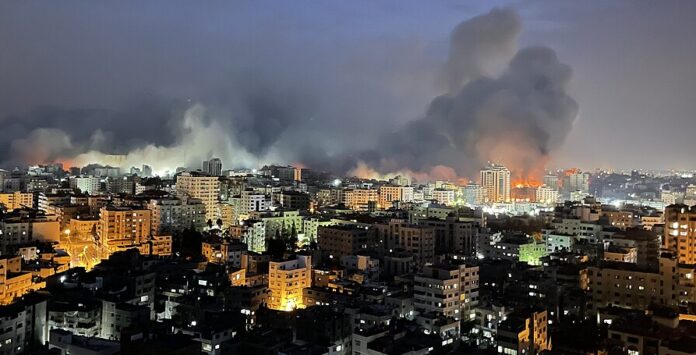Israel carries out a significant airstrike on a building in southern Beirut after issuing urgent evacuation warnings to residents
In the early hours of April 27, 2025, Israel carried out a targeted airstrike on a building in southern Beirut, after issuing an urgent evacuation order to residents of the area. The strike is part of the ongoing conflict in the region, which has seen increased hostilities in recent weeks, with both sides taking escalatory actions amid a turbulent geopolitical environment.
This latest Israeli strike follows a pattern of military escalation, including significant confrontations with Hamas in Gaza. The Israel Defence Forces (IDF) warned the residents of the targeted building to evacuate before the strike occurred, with the authorities citing concerns of “imminent threat” from military activities in the region.
Israel’s military operations have been a response to increasing security threats and hostile actions from Iran-backed militant groups operating in southern Lebanon. While the nature of the targets was not immediately clear, analysts suspect they may be linked to Hezbollah or other factions allied with Iran. Israel’s strategy has focused on disrupting military infrastructure and reducing the capacity of these groups to carry out further attacks on Israeli territory.
In related developments, Israeli Prime Minister Benjamin Netanyahu has faced criticism following claims made by the head of Shin Bet, Israel’s domestic security agency. The Shin Bet chief alleged that Netanyahu had ordered surveillance on political protesters, including activists opposed to the government’s handling of the ongoing conflict. Netanyahu has denied the accusation, stating that no such orders were given.
This controversy comes amid growing domestic unrest, as protests continue to emerge in Israel over various issues, including military strategy and political decision-making. However, Netanyahu’s government maintains that surveillance measures are necessary for national security.
Meanwhile, in Gaza, the Gaza Health Ministry reported that over 50 people had been killed and more than 115 wounded in the last 24 hours, as the ongoing conflict shows no signs of abating. The region has been under a heavy military bombardment, with civilian casualties mounting as both sides escalate their hostilities. Reports also suggest that Hamas, the Palestinian militant group, is considering an offer to release all hostages in exchange for a five-year ceasefire. This development adds a potential diplomatic path to the otherwise war-torn situation.
On the diplomatic front, U.S.-Iran talks are scheduled to resume on Saturday, as both nations attempt to de-escalate the situation in the Middle East. The U.S. has been heavily involved in attempting to mediate the conflict, offering both humanitarian aid and diplomatic channels to ease tensions. The next round of talks could hold the key to reducing the violence that has consumed both Gaza and southern Lebanon for months.
The Israel-Hamas conflict has had far-reaching consequences, not just for the Middle East but for global security. The heightened violence has led to calls for international intervention, particularly from the United Nations and human rights organisations, which have expressed concern over the growing number of civilian casualties and the destruction of infrastructure in Gaza.
The current ceasefire talks between Hamas and Israel could mark a crucial moment in the conflict. However, the negotiations remain precarious, with both sides holding firm on their demands. If the hostage release is indeed part of a broader ceasefire deal, it would represent a significant shift in the dynamics of the conflict, potentially opening the door for a longer-term resolution.
As the situation in Lebanon, Gaza, and Israel continues to evolve, the international community remains on edge, watching the region closely for any signs of further escalation or diplomatic breakthrough. With both sides entrenched in their positions, the possibility of a peaceful resolution remains uncertain.
